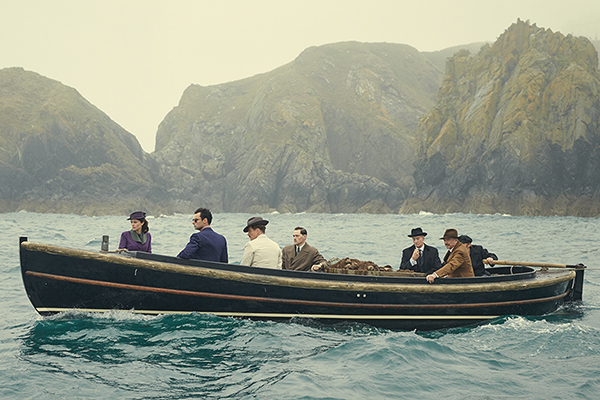Features
My Favourite TV Adaptations

Mark Aldridge recommends his favourite Agatha Christie adaptations
You never need an excuse to settle down in front of a television adaptation of an Agatha Christie story, but if you’re stuck inside and looking for something to entertain you, here are some of my top choices:
Why Didn’t They Ask Evans? (1980)
Why Didn’t They Ask Evans? was British television’s first proper adaptation of an Agatha Christie story for decades, and this production was something of a test of concept, to ensure that her stories could be adapted in a faithful way that still worked for home viewing. This light adventure mystery was a good choice, as it follows an investigation into a dying man’s mysterious final words, and although murder is at the heart of the story the characters are still having a great time. You can also enjoy spotting actors who you’ll recognise from other adaptations – this is one of John Gielgud’s four appearances in Christie screen productions, and Joan Hickson has fun playing a character quite unlike Miss Marple, while James Warwick and Francesca Annis seem to be rehearsing their later appearances as Tommy and Tuppence.
Murder is Easy (1982)
Do you remember when Agatha Christie’s characters used a computer in order to try and find out the identity of the murderer? Possibly not, but it did happen – albeit in a television adaptation rather than in one of her original stories! This production, starring Bill Bixby (aka The Incredible Hulk’s David Banner) brings the action bang up to date – for 1982. It’s fun to see a now old-fashioned ‘modern’ twist on Christie’s story, but for the most part the original mystery is well preserved, and the action is helped by the appearance of film stars Olivia de Havilland and Helen Hayes (prior to her taking on the role of Miss Marple for American television).
The Agatha Christie Hour (1982)
Agatha Christie didn’t just write murder mysteries, she also had a talent for telling stories about relationships and troubled characters. The Agatha Christie Hour looked beyond the likes of Poirot and Miss Marple as it adapted ten short stories that tended to focus more on characters than crime. Most are quite gentle but still feature some sort of mystery, although they’re not necessarily related to criminal activity. They’re often about individuals who find themselves in unwanted circumstances, whether that’s a troubled romantic relationship (as in ‘Magnolia Blossom’) or a bored retired major looking for adventure (‘The Case of the Discontented Soldier’). Two of the adaptations are of Parker Pyne stories (starring Maurice Denham), the only screen treatment of the detective’s adventures to date, while Miss Lemon and Ariadne Oliver also make appearances.
Agatha Christie’s Miss Marple (1984-92)
For eight years Joan Hickson reigned supreme as the BBC’s Miss Marple in a series that adapted all twelve of Christie’s novels featuring the spinster sleuth. Lavishly produced with casts full of familiar faces, these faithful adaptations are a perfect comfort viewing and a great introduction to Christie for people who are new to her. It’s difficult to choose the best of an excellent selection, but A Murder is Announced must be a contender (which is no surprise as it’s one of the best Miss Marple novels), while Nemesis features what is probably the series’ best scene, as a steely Joan Hickson forces the murderer to face up to the truth of what they have done.
Agatha Christie’s Poirot (1989-2013)
Where do you start with a much-loved series that spanned nearly a quarter of a century on television? Pretty much anywhere you like is the answer, as there is so much to enjoy in these adaptations starring David Suchet. If you want some classic Christie then why not revisit the very first Hercule Poirot story The Mysterious Affair at Styles, in which he solves a traditional country house murder. If you’re looking for some light character fun, including Poirot’s ill-fated attempt to become a housebreaker, then The Veiled Lady is a great candidate that’s highly entertaining. But if you prefer a heavy atmosphere with a horror twist, then watch Mark Gatiss’s adaptation of the underrated and cynical Hallowe’en Party.
And Then There Were None (2015)
If you like your Christie dark, your murders brutal, and your ‘heroes’ to have questionable morals, then you can’t do much better than Sarah Phelps’s adaptation of And Then There Were None for the BBC. A hard-edged and gritty tale of isolation and suspicion, this stylish production brings Agatha Christie’s 1939 masterpiece into the 21st century, while never losing sight of what made the novel a classic in the first place. You’re guaranteed to have at least one surprise in store.

Dr Mark Aldridge is a senior lecturer in Film and Television at Solent University, and an Agatha Christie historian. He's author of Agatha Christie on Screen and Agatha Christie's Poirot: The Greatest Detective in the World, which tells the story of a century of the Belgian detective.
Where to watch the shows
And Then There Were None, Murder is Easy, The Agatha Christie Hour and Why Didn't They Ask Evans? are available on DVD. Episodes of Agatha Christie's Miss Marple and Agatha Christie's Poirot are available on DVD as well as various online streaming platforms around the world.


 UK
UK 